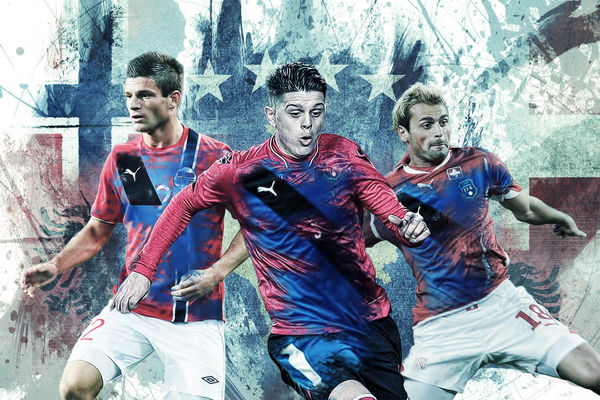TURKU, Finland — Six white stars lay on the grass as a wordless national anthem played. The 11 players dressed in blue, yellow and gold stood in silence, hands on hearts, as the camera passed across their faces at the Veritas Stadion. In the late-night last moments of a Nordic summer, the air began to turn cold.
The 8,000-strong crowd were as silent as the players as the music played. It was not that they did not know the words, nor that this moment wasn't of sufficient magnitude to warrant learning them. Nothing could be further from the truth. The truth was that there were no words to sing.
It was the first ever competitive game for the Kosovo national team, which had undergone a near-two-decade journey for recognition that had led to here, a World Cup qualification match against Finland for Russia 2018.
By the time FIFA made the decision to recognize Kosovo in May 2016, the World Cup qualification groups had already been drawn. Kosovo couldn't play in Group H with Bosnia and Herzegovina because of the potential political fallout. So they were placed in Group I, which had its own problems.
On Thursday, Kosovo play their first competitive home game against Croatia, a fixture that will raise the ghosts of the Yugoslav War. It will take place in Albania, as no stadium exists in Kosovo capable of hosting the match. Three days later they are due to play Ukraine, but Ukraine have refused them permission to play in Kiev, as the government does not recognize Kosovo.
But first there was Finland, in Turku. The six white stars on the grass, and the blue, yellow and gold of the jersey, are from Kosovo's flag, which could not be flown at a football match before FIFA's official recognition. The national anthem played without any words because it doesn't have any, a decision taken so as not to spark nationalist ire in a part of the world that has largely been defined by it in recent history.
Kosovo fans outside the stadium in Turku, Finland.
The crowd in Turku were mostly made up of Kosovans who had fled the 1998-99 Kosovo War, which killed thousands and eventually led to the territory's 2008 declaration of independence from Serbia, which maintains that Kosovo is its historic heartland.
The fans, like the players lining up for the match, had fled the war and found refuge in Finland, Norway, Switzerland and, like Kosovo's coach, Sweden.
Albert Bunjaki stood to attention in a suit with no tie as the wordless anthem played. He has been in charge of Kosovo for seven years, even though the team had spent most of that time in the international wilderness, unrecognised and tangled in the politics of bureaucracy and the bureaucracy of politics.
Behind him stood Fadil Vokrri, the president of the Football Federation of Kosovo (FFK). He was once Kosovo's greatest player and the only Kosovan to play for the Yugoslav national team. Next to Vokrri was his loyal general secretary, Eroll Salihu, whose playing career had been cut short by the war but who had started an illegal football league in Kosovo when the official one was banned by Serbian authorities.
Vokrri and Salihu had been pursuing an often fruitless and at times quixotic eight-year campaign for the world, which doesn't recognize Kosovo as a country, to recognise a Kosovo football team.
The national anthem finished and the crowd roared at its unfamiliar team. For months, if not years, the identity of the team at this moment had been wildly speculated on.
A fan wears a half-and-half flag to represent the nations of Kosovo (left) and Albania. Photo by James Montague.
What would happen to players like Arsenal's Granit Xhaka or Stoke City's Xherdan Shaqiri, who both had more than 40 caps for the Swiss national team? Shaqiri was born in Kosovo, Xhaka in Switzerland to Kosovan parents. Or to Adnan Januzaj, of Kosovan descent but a native of Belgium who’d played for the Red Devils? Would they be allowed to switch nationalities?
International football was faced with a unique set of circumstances, which had sparked a heated debate that went much deeper. It became a matter of nationality, identity and belonging, while asking important questions about the refugee experience: Who are you, and who do you truly belong to?
Bunjaki had been in the centre of this political maelstrom, and yet even he'd had no idea what his team would be until the very last moment, nor how they would play. The first time he saw them all train together was a few days before the Finland match.
They were ranked as one of the worst teams in the world by FIFA. Would they be the whipping boys of the group, or would they become more than the sum of their parts, driven by something bigger even than the World Cup, hosted in a country that still refuses to recognise them?
The referee blew his whistle. Bunjaki and the rest of the world were about to find out.




















